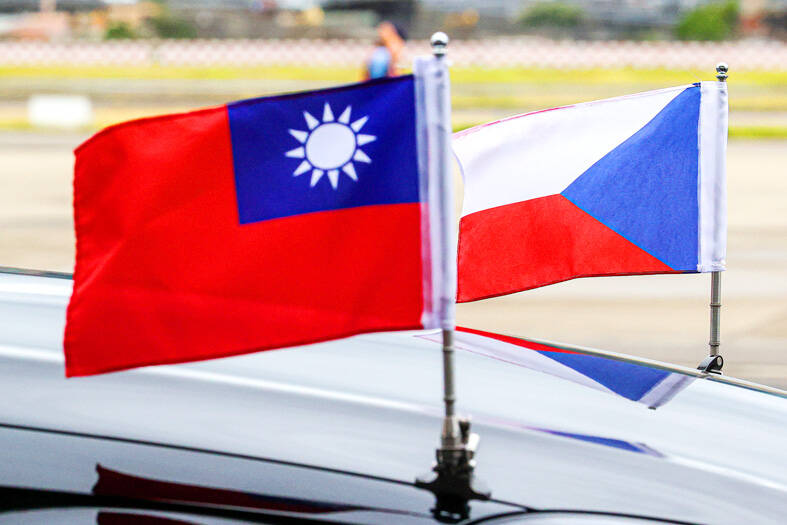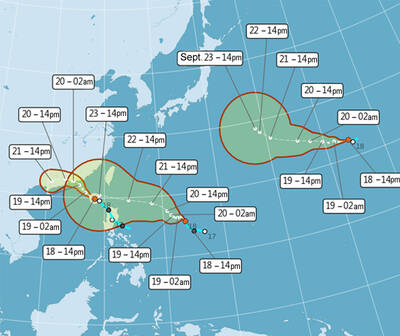The Ministry of Foreign Affairs (MOFA) yesterday thanked the Czech Senate for passing a draft resolution rejecting China’s interpretation of UN Resolution 2758 and supporting Taiwan’s membership in international organizations.
Passed on Tuesday, the draft resolution, brought by Czech Senator Pavel Fischer, says that the UN resolution makes no mention of Taiwan and does not establish China’s sovereignty over it, nor does it preclude Taiwan’s participation in UN agencies.
China should not seek to distort the meaning of UN Resolution 2758 by conflating it with its so-called “one China” principle for political reasons, the resolution says.

Photo: CNA
Distorting the meaning of UN documents for political aims would affect not just Taiwan and China, but the Czech Republic and other countries, Fischer said.
The Czech Republic will continue to pursue its own policy, ensuring mutually beneficial relationships with both the People’s Republic of China and Taiwan, Fischer added.
The resolution also calls for Taiwan’s “meaningful” participation in international organizations, including Interpol, the International Civil Aviation Organization, the WHO and the UN Framework Convention on Climate Change.
Fifty of the 65 senators present voted in favor of the resolution.
It comes five months after the Foreign Affairs Committee of the Czech Chamber of Deputies passed a resolution opposing China’s distortion of UN Resolution 2758.
Both resolutions demonstrate the Czech government’s firm support for Taiwan and the close relationship between both countries, MOFA said in a news release yesterday.
Taiwan urges the international community to counter China’s misinterpretation of UN Resolution 2758, and Taiwan will continue to work with like-minded partners around the world to oppose authoritarian regimes and defend the shared values of democracies, the news release cited Minister of Foreign Affairs Lin Chia-lung (林佳龍) as saying.
Over the past few years, several government bodies around the world, including the US House of Representatives, the European Parliament, the British parliament and the Canadian House of Commons, have passed similar motions in support of Taiwan.
Most recently, at a UN Security Council meeting on Wednesday last week, the US for the first time brought up Taiwan’s participation in the UN and other international organizations, saying that Beijing is “misusing” UN Resolution 2758.

The Coast Guard Administration (CGA) yesterday said it had deployed patrol vessels to expel a China Coast Guard ship and a Chinese fishing boat near Pratas Island (Dongsha Island, 東沙群島) in the South China Sea. The China Coast Guard vessel was 28 nautical miles (52km) northeast of Pratas at 6:15am on Thursday, approaching the island’s restricted waters, which extend 24 nautical miles from its shoreline, the CGA’s Dongsha-Nansha Branch said in a statement. The Tainan, a 2,000-tonne cutter, was deployed by the CGA to shadow the Chinese ship, which left the area at 2:39pm on Friday, the statement said. At 6:31pm on Friday,

PEAK MONTHS: Data showed that on average 25 to 27 typhoons formed in the Pacific and South China seas annually, with about four forming per month in July and October One of three tropical depressions in the Pacific strengthened into a typhoon yesterday afternoon, while two others are expected to become typhoons by today, Central Weather Administration (CWA) forecaster Lee Ming-hsiang (李名翔) said yesterday. The outer circulation of Tropical Depression No. 20, now Typhoon Mitag, has brought light rain to Hualien, Taitung and areas in the south, Lee said, adding that as of 2pm yesterday, Mitag was moving west-northwest at 16kph, but is not expected to directly affect Taiwan. It was possible that Tropical Depression No. 21 would become a typhoon as soon as last night, he said. It was moving in a

The American Institute in Taiwan (AIT) put Taiwan in danger, Ma Ying-jeou Foundation director Hsiao Hsu-tsen (蕭旭岑) said yesterday, hours after the de facto US embassy said that Beijing had misinterpreted World War II-era documents to isolate Taiwan. The AIT’s comments harmed the Republic of China’s (ROC) national interests and contradicted a part of the “six assurances” stipulating that the US would not change its official position on Taiwan’s sovereignty, Hsiao said. The “six assurances,” which were given by then-US president Ronald Reagan to Taiwan in 1982, say that Washington would not set a date for ending arm sales to Taiwan, consult

A Taiwanese academic yesterday said that Chinese Ambassador to Denmark Wang Xuefeng (王雪峰) disrespected Denmark and Japan when he earlier this year allegedly asked Japan’s embassy to make Taiwan’s representatives leave an event in Copenhagen. The Danish-language Berlingske on Sunday reported the incident in an article with the headline “The emperor’s birthday ended in drama in Copenhagen: More conflict may be on the way between Denmark and China.” It said that on Feb. 26, the Japanese embassy in Denmark held an event for Japanese Emperor Naruhito’s birthday, with about 200 guests in attendance, including representatives from Taiwan. After addressing the Japanese hosts, Wang